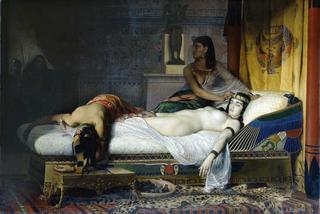Pridie Kalendas September

Modern Date : August 31st Market Day
Pridie Kalendas September
Day Before the Kalends of September
This is one of the dies comitiales when committees of citizens could vote on political or criminal matters.
This was the birthday of Caligula, the mad emperor. He was born Gaius Julius Caesar Germanicus at Antium (Anzio). On this day in 40 AD he returned from his expedition to the channel, where he collected seashells. He celebrated a triumph over Poseidon for this victory.
The emperor Commodus, another nut case, son of Marcus Aurelius, was also born this day at Lanuvium in 161 AD. He was the first emperor to fight seriously in the gladiatorial games. He died because of this passion.
August was originally called Sextilis, or the sixth month (after March). It was renamed in honor of Augustus Caesar, the most revered of the Roman emperors.
Eyos
In the Nigerian capitol of Lagos, masqueraders called Eyos wander the streets concealed in white robes, carrying long sticks. Each represents an individual family and symbolizes authority. A person crossing the path of an Eyo must remove his hat and shoes as a sign of respect. An offended Eyo will attack with its stick.
Raymond Buckland
This day is the birthday of Raymond Buckland who, with his first wife Rosemary, is credited with bringing Gardnerian Wicca to the USA.
Raymond Buckland came to the United States from England in 1962. He had written television comedy scripts for ITV's The Army Game and a pilot, Sly Digs, for BBC-TV. He was also personal scriptwriter for the British comedian Ted Lune. In the past thirty-two years he has had over thirty books published - fiction and non-fiction - with over a million copies in print. Titles have been translated into thirteen foreign languages. His publishers have included Ace Books, Warner Books, Prentice Hall/Parker, Samuel Weiser, Inner Traditions International, Galde Press, Visible Ink Press, Citadel, and Llewellyn Worldwide, Ltd. He has also written newspaper and magazine articles and five screenplays. Two of his books are each in their thirtieth printing; each with over 360,000 copies in print. One of his titles was a Book of the Month Club selection and another won the 1999 Visionary Award for non-fiction books.
Considered an authority on the occult and the supernatural, Raymond Buckland has served as Technical Advisor for the Orson Welles movie Necromancy, and has also worked as an advisor for a stage production of Macbeth with William Friedkin, director of The Exorcist, etc. Raymond is of Romany (Gypsy) descent and, as such (so he claims), is an authority on the Gypsies, four of his books being on that particular subject. He has lectured at colleges and universities across North America, including Penn. State University, University of Western Illinois, University of North Dakota, University of New Orleans, Kent State and Oberlin College (Ohio), New York State University, Ohio's Cincinnati University, and San Diego City College. He has been written up in such newspapers and magazines as The New York Times, Los Angeles Times, New York Daily (and Sunday) News, Cleveland Plain Dealer, National Observer, Look Magazine, Cosmopolitan, True, and many others.
Raymond Buckland has appeared on numerous radio and television talk programs, including: The Dick Cavett Show, Tom Snyder's Tomorrow Show, Not For Women Only (with Barbara Walters), The Virginia Graham Show, The Dennis Wholey Show, and the Sally Jessy Raphael Show. He has been seen on BBC-TV England, RAI-TV Italy, and CBC-TV Canada. He has appeared extensively on stage in England and played small character parts in movies in America.
Raymond has taught courses at New York State University, Hofstra University, New Hampshire Technical College and for Hampton (Virginia) City Council. He is listed in a number of reference works including Contemporary Authors, Who's Who in America, Men of Achievement, and International Authors and Writers Who's Who.
His latest books are The Spirit Book, Buckland’s Book of Spirit Communications, Wicca For One, and Cards of Alchemy. A DVD version of his Wicca video has also recently been released: Rebirth of the Old Religion. A prolific author, Raymond Buckland is currently working on his autobiography. Today he lives on a small farm in north-central Ohio.

